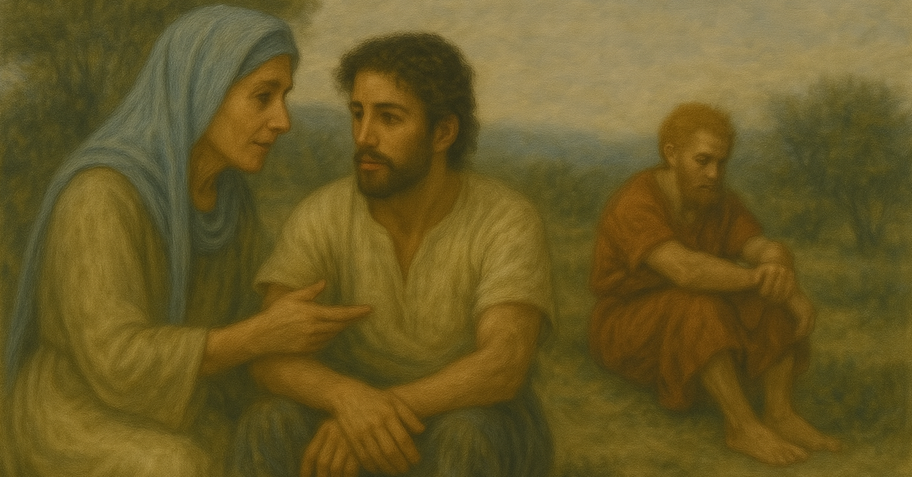What Is a Generational Sin?

I am very blessed to come from two large families on my mother’s side of our family. My maternal grandmother was one of nine children and my maternal grandfather was also one of nine children. My grandparents and their siblings were born in the late eighteen hundreds and the early nineteen hundreds. My ancestors were very hard-working people.
Our family included soldiers, farmers, blacksmiths, carpenters, preachers, mechanics, architects, saddle makers and many dedicated mothers. Every one of my ancestors made their own way and earned their money in difficult times. They were basically good people who persevered through many agonizing years of personal and financial difficulties. Many of my ancestors were loving, steadfast, courageous, faithful, realistic and practical people. They did the best that they could do in spite of the circumstances of their lives.
As individuals and families, we have committed many generational sins over the years.
Photo Courtesy: ©GettyImages/skynesher

Defining "Generational Sin"
What is generational sin? It is disobeying God’s commandments by sinning against His laws. It is also worshipping anything other than God.
Generational sins are weaknesses or tendencies that are handed down to us through the generations from parents or members of our family. These sins can involve behavioral patterns and ways of thinking that keep us trapped in the past. Even though sin can be passed down through the generations, each person is responsible for his or her personal sins against the Lord.
Ezekiel 18:30-32 says, “Therefore I will judge you, O house of Israel, each one in accordance with his conduct,” says the Lord God. “Repent (change your way of thinking) and turn away from all your transgressions, so that sin may not become a stumbling block to you. Cast away from you all your transgressions, which you have committed [against Me], and make yourselves a new heart and a new spirit! For why should you die, O house of Israel? For I have no pleasure in the death of anyone who dies,” says the Lord God. “Therefore, repent and live!” (AMP)
My family has been plagued with the following generational sins: unforgiveness, lying, bitterness, fear, worry, judgment, resentment, pride, rejection, envy, jealousy, anger, abuse, covetousness, doubt, unbelief, rebellion, drunkenness, manipulation, greed, lust, idolatry, fornication, adultery, hatred, molestation, incest and revenge.
Photo Credit: ©iStock/Getty Images Plus/Lee Edwards

Generational Sin Can Multiply and Become a Stronghold
Generational sins have many patterns. Once a sin pattern begins in a family, it can continue and multiply among the family members. It can last for four generations and can become a stronghold and a stumbling block for the whole family. Generational sin is not only disobeying God’s commandments. It is also worshipping anything other than God, which is idolatry. Exodus 20: 4-6 says, “You shall not make for yourself an idol, or any likeness of what is in heaven above or on the earth beneath or in the water under the earth. You shall not worship them or serve them; for I, the Lord your God, am a jealous God, visiting the iniquity of the fathers on the children, on the third and the fourth generations of those who hate Me, but showing loving kindness to thousands, to those who love Me and keep My commandments.” (NASB)
Photo Courtesy: ©GettyImages/urbazon

Generational Sin in the Bible
Abraham’s family is a prime example of generational sin repeating itself from one generation to another. In Genesis 12 Abraham lied about his relationship with his wife Sarai. He told her to say that she was his sister. He knew that she was a beautiful woman and he was afraid that if he told the Egyptians that she was his wife, they would kill him and take her. Pharaoh’s officials praised Sarai to Pharaoh and they took her to his house and he took her for his wife.
“But the Lord struck Pharaoh and his house with great plagues because of Sarai, Abram’s wife.” (Genesis 12:17 NASB) When Pharaoh realized that she was his wife, he told Abraham to take her and go. Abraham lied because he was afraid of being murdered and losing Sarai. The lying spirit in Abraham’s family continued to the next generation. In Genesis 26 Isaac told the men of Gerar that his wife, Rebekah, was his sister. He was afraid that they would kill him and take her. Both father and son lied about their wives because of their own sins of fear and doubt.
Photo Courtesy: Unsplash/SixteenMilesOut

Rebekah and Jacob's Deception
In Genesis 27 Jacob deceived Isaac and stole his birthright and blessing. It was important for Isaac to give the first-born family blessing to Esau, the one whom God had chosen. Rebekah heard Isaac say that he was going to give Esau the first-born blessing so she schemed to get the blessing for Jacob. She arranged with Jacob to deceive Isaac when he brought him a meat dish so that Esau would not get the blessing. The sins of lying and the deception of his mother and brother were agonizingly painful to Esau who had to live the rest of his life without the blessing of the first born, which was rightfully his.

King David's Generational Sin and Consequences
King David committed generational sins, which resulted in death. He lusted after Bathsheba, the wife of one of his soldiers. He arranged to sleep with her and she became pregnant. After finding out about her pregnancy, David sent her husband Uriah into a fierce battle and had him assigned to the most dangerous position in the battle. Uriah died in the battle. Bathsheba mourned for her husband. When her time of mourning was over, David brought her to his house and she became his wife.
“But the thing that David had done was evil in the sight of the Lord.” 2 Samuel 11:27b (AMP)
The Lord sent Nathan, a prophet and advisor of David, to tell him that he would be punished for the murder of Uriah but he would live. He also told him that the son that he had with Bathsheba would die. 2 Samuel 12:13-14 says, “And David said to Nathan, “I have sinned against the LORD.” And Nathan said to David, “The LORD also has allowed your sin to pass [without further punishment]; you shall not die. Nevertheless, because by this deed you have given [a great] opportunity to the enemies of the Lord to blaspheme [Him], the son that is born to you shall certainly die.” (AMP)
David’s son became ill soon after he was born. David prayed and fasted. On the seventh day, his son died. King David who was called ”a man after God’s heart” lied, lusted and committed adultery. Then he manipulated battle positions to have Uriah killed in a fierce battle. His punishment was the death of his son.
Photo Courtesy: ©Created by AI

God's Provision for Our Release from Generational Sin
We do not have to surrender to the binding power of our sins or the sins of the generations. God made provision for our release from our sins many years ago when His son, Jesus, died for our sins on the cross. When we appropriate Jesus’ sacrifice for our sins for ourselves and confess our sins, we have taken the first step to break the binding power of generational sin. When the binding power of sin is broken, we can receive the grace to forgive that God offers each one of us. He is a loving God and He makes space for grace in His heart for each one of us when we turn to Him and release the offenses from others that we have been holding onto. Along with grace He provides compassion and mercy to release our past to Him.
We can always pray, as the psalmist did in Psalm 79:8-9. “O do not remember against us the sins and guilt of our forefathers. Let Your compassion and mercy come quickly to meet us, For we have been brought very low. Help us, O God of our salvation, for the glory of Your name; Rescue us, forgive us our sins for Your name’s sake.” (AMP)
Read more about Generational Curses - what causes them and how to break them, at Christianity.com.
Nan Brown Self is a retired Licensed Professional Counselor and Registered Play Therapist. She is a former member of the American Association of Christian Counselors and has counseled families, individuals and children for over 10 years. She has a BA degree in Psychology from the University of Texas at Dallas and a Master of Education degree from the University of North Texas at Denton. Nan and her husband live in Texas. For more information visit www.ForgivenessByGrace.com
Photo Courtesy: © Unsplash/Yannick Pulver
Originally published August 25, 2025.








